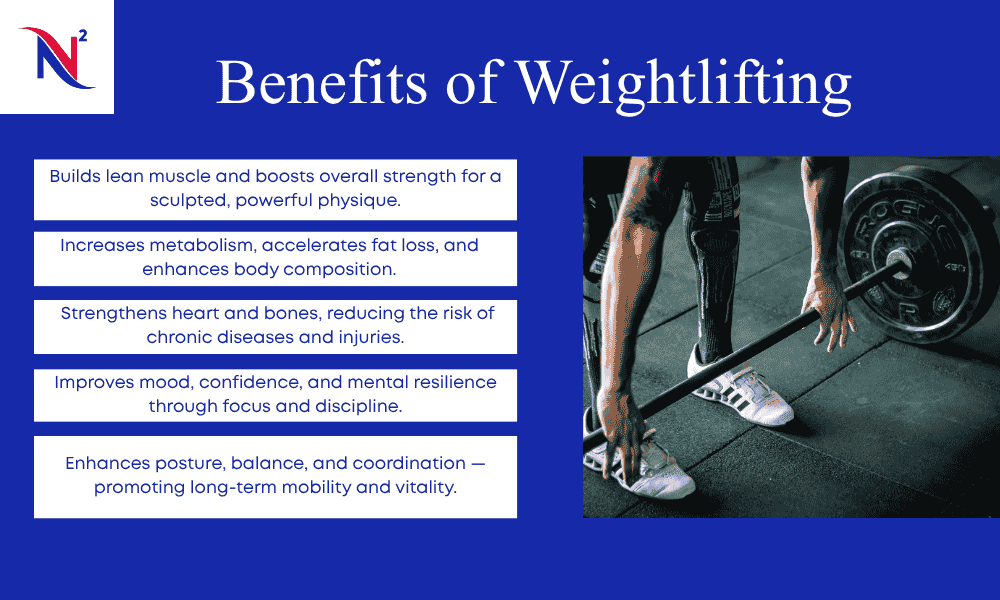In today’s rapidly evolving fitness landscape, weightlifting has transcended the stereotype of bodybuilders and powerlifters. It is now regarded as one of the most efficient and transformative methods to enhance overall health, strength, and vitality. Whether your goal is to sculpt a lean physique, elevate athletic performance, or simply move better in everyday life, incorporating weightlifting into your fitness routine can reshape both body and mind.
Let’s delve deeper into the powerful, science-backed benefits of weightlifting — and understand why it’s not just about lifting weights, but about lifting your entire standard of living.
💪 1. Builds Lean Muscle and Functional Strength
At its foundation, weightlifting stimulates muscle hypertrophy — the biological process that increases muscle fiber size. As a result, you gradually develop stronger, leaner muscles that improve your overall body composition.
Beyond aesthetics, greater muscle mass translates to enhanced functional strength. This means that everyday movements — from lifting groceries to climbing stairs — become easier, more efficient, and less fatiguing. Over time, you’ll notice improved endurance, better body alignment, and a higher capacity to perform physical activities with ease and precision.
Furthermore, resistance training strengthens connective tissues such as tendons and ligaments, promoting joint stability and reducing the risk of injuries — both inside and outside the gym.
🔥 2. Accelerates Metabolism and Supports Fat Loss
Unlike fat tissue, muscle tissue is metabolically active, requiring more energy even at rest. Therefore, as you increase your muscle mass, your resting metabolic rate rises, allowing your body to burn calories more efficiently — even during periods of inactivity.
In contrast to cardio exercises that primarily burn calories during activity, weightlifting provides a long-term metabolic boost known as the afterburn effect or EPOC (Excess Post-Exercise Oxygen Consumption). This phenomenon ensures that your body continues burning calories for several hours after the workout, making resistance training a superior choice for sustainable fat loss and metabolic health.
❤️ 3. Strengthens Heart and Bone Health
Although traditionally viewed as a muscle-building practice, weightlifting also delivers remarkable cardiovascular benefits. Regular resistance training helps lower blood pressure, improve circulation, and enhance heart efficiency.
Equally significant, lifting weights places positive stress on bones, triggering the formation of new bone tissue and increasing bone mineral density. Over time, this process helps prevent osteoporosis and age-related bone deterioration — especially vital for women and older adults.
In essence, every lift not only fortifies your muscles but also strengthens your heart, bones, and overall structural integrity.
🧠 4. Enhances Mental Health and Psychological Resilience
Weightlifting is as much a mental discipline as it is a physical one. Each rep demands focus, determination, and patience — qualities that naturally strengthen your mindset over time.
The act of lifting triggers the release of endorphins and dopamine, the body’s natural “feel-good” hormones, which help alleviate stress, anxiety, and depression. As you progress, you gain not only physical strength but also an unwavering sense of self-efficacy and confidence.
Moreover, structured resistance training cultivates mental resilience — teaching you how to set goals, overcome setbacks, and celebrate incremental victories. These habits extend beyond the gym, influencing your professional, emotional, and personal growth.
⚡ 5. Improves Posture, Balance, and Coordination
Weightlifting emphasizes stability and alignment, strengthening the core and posterior chain — the muscles responsible for supporting posture. Improved posture reduces strain on the spine, minimizes back pain, and enhances body mechanics.
Furthermore, the controlled, repetitive nature of weightlifting refines neuromuscular coordination, improving balance and overall motor control. Consequently, your movement patterns become more efficient, reducing the likelihood of falls or injuries, particularly as you age.
🩺 6. Promotes Longevity and Disease Prevention
Scientific evidence consistently supports that individuals who engage in regular strength training experience lower rates of chronic diseases, including diabetes, heart disease, and arthritis.
Weightlifting enhances insulin sensitivity, regulates blood sugar levels, and improves metabolic efficiency — all of which are critical factors for long-term health. Moreover, maintaining muscle mass with age prevents sarcopenia (age-related muscle loss), thereby supporting mobility, independence, and overall longevity.
In essence, consistent strength training doesn’t just extend lifespan — it improves healthspan, the quality of those extra years.
🌟 7. Cultivates a Growth-Oriented Mindset
Beyond its physical benefits, weightlifting is a powerful metaphor for personal growth. Each training session teaches perseverance, patience, and progression. The process of setting goals, breaking plateaus, and celebrating progress nurtures a mindset of continuous improvement.
Over time, lifters develop not only stronger bodies but also stronger character — built on discipline, humility, and resilience.
Conclusion: Lift to Live Better
Ultimately, weightlifting is far more than a form of exercise — it’s a philosophy of self-improvement. It fortifies the body, refines the mind, and builds confidence from the inside out.
Whether you’re new to fitness or a seasoned athlete, incorporating structured weight training into your routine can profoundly impact your physical health, mental clarity, and long-term well-being.
So, start gradually, lift mindfully, and remain consistent. Because in the world of strength training, every rep is a step toward a stronger, more resilient version of yourself.




